Rubella in pregnancy
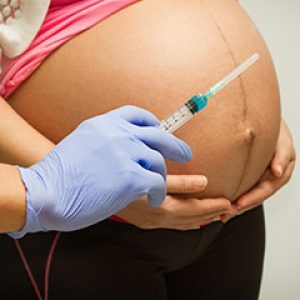 Rubella refers to infections spread by airborne droplets.This disease is considered childish, but according to statistics, adults carry the infection also quite often.If for men rubella does not pose any danger, during pregnancy a woman's rubella will lead to a disappointing verdict - an artificial termination of pregnancy beyond 12 weeks or intrauterine fetal death in the early stages.
Rubella refers to infections spread by airborne droplets.This disease is considered childish, but according to statistics, adults carry the infection also quite often.If for men rubella does not pose any danger, during pregnancy a woman's rubella will lead to a disappointing verdict - an artificial termination of pregnancy beyond 12 weeks or intrauterine fetal death in the early stages.
How the virus affects the fetus
The defeat of the fetal rubella virus is unavoidable, and the degree of negative impact is completely independent of how badly the infection is in a pregnant woman.The patient may not notice any changes in her state of health, but the virus immediately penetrates the placenta and begins to have a harmful effect on the fetal tissue, disrupting the formation of organs and systems.
Note : the severity of the affected fetus depends only on what period of pregnancy the woman was infected with the rubella virus.
 The doctors adopted the following differentiation:
The doctors adopted the following differentiation:
- infection at 3-4 weeks of gestation leads to congenital malformations in 60% of cases;
- for infection of a woman with rubella for 10-12 weeks - in 15% of cases;
- If the pregnancy is already at the period of 13-16 weeks of pregnancy, the risk of congenital malformations is reduced to 7%.
Critical periods are:
- 3-11 week of pregnancy - during this period the rubella virus affects the nervous system of the fetus;
- 4 and 7 weeks - the infection has a disastrous effect on the organs of vision and heart;
- 7-12 week - there is a defeat of the organs of hearing.
Note : the less the gestation period at which a pregnant woman has become infected with rubella, the more vices in the development of the fetus will be heavier.
An enormous risk for rubella infection is pregnancy at the term of 9-12 weeks - the infection often leads to fetal death( frozen pregnancy) or miscarriage.Even if the fetus survives, the birth of a child with disrupted functions of organs and systems is projected with a probability of 98%.
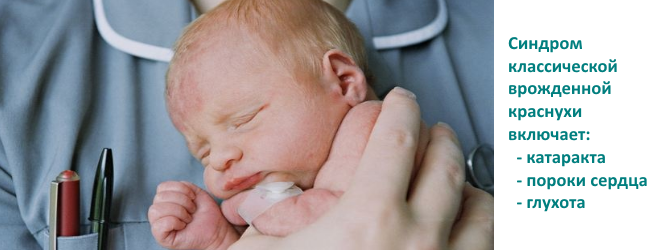
If the rubella was diagnosed early in pregnancy( up to 12 weeks) and the fetus was preserved, the baby is born with a minor rubella syndrome, which includes the so-called Greta triad - deafness / cataract / heart disease. Statistics show:
- in 98% of cases, heart disease in newborns is diagnosed;
- in 84% of cases, the consequence of rubella in early pregnancy is the cataract of newborns;
- in 22% of cases the child shows deafness and vestibular disorders.
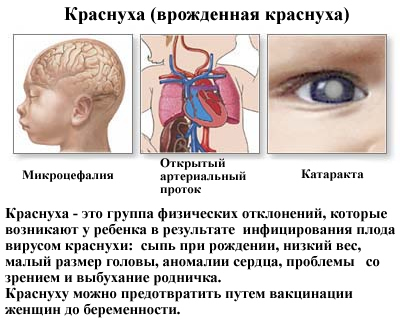
In addition to the above problems, rubella in early pregnancy leads to the birth of a child with impaired development of the liver / spleen / urogenital system.
Note : in 70% of cases, rubella is caused by brain and nervous system damage - for example, babies with hydrocephalus and / or microcephaly are born.
It is noted that with the growth of an already born child, there is a progression of mental retardation, mental development is reduced, and a physical development gap may be observed.In some cases, it all ends very sadly - the child is diagnosed with idiocy, he loses the ability for any training and spends his life in specialized boarding schools.
Please note
: in case of infection with rubella at 13-20 weeks of pregnancy, the risk of developing intrauterine malformations of the fetus is significantly reduced, but it should be noted that the hearing organs are exposed to pathological influences during this period( up to 16 weeks gestation).If a woman has an infectious pathology that develops for more than 20 weeks, the risks of intrauterine developmental impairment are significantly reduced, but there remains a great chance of a child with lesions of the central nervous system and sensory organs.Analyzes and inoculations before pregnancy
 The problem is that rubella, even in childhood, often goes unnoticed.A woman should not trust the words of her parents or rely on a child's memory - "there were rashes", "lymph nodes" increased.Yes, it is considered a symptom of child rubella, but they can also testify about other diseases.And even if all medical documents are preserved, they have a medical record on rubella diagnosis, do not carelessly treat the probability of infection with the virus in question.According to medical research, even after rubella once suffered immunity to this infection may not develop.Moreover, even if vaccinations were made in childhood, this does not become a guarantee of safety.
The problem is that rubella, even in childhood, often goes unnoticed.A woman should not trust the words of her parents or rely on a child's memory - "there were rashes", "lymph nodes" increased.Yes, it is considered a symptom of child rubella, but they can also testify about other diseases.And even if all medical documents are preserved, they have a medical record on rubella diagnosis, do not carelessly treat the probability of infection with the virus in question.According to medical research, even after rubella once suffered immunity to this infection may not develop.Moreover, even if vaccinations were made in childhood, this does not become a guarantee of safety.
You can not rely only on a common opinion: there were characteristic eruptions or previously vaccination - you should not worry, immunity is already available.When planning pregnancy, it is necessary to pass tests - blood for antibodies to rubella, which will become an accurate confirmation of either existing immunity or its absence.
So, when planning pregnancy, you need to undergo an examination for the presence of antibodies in the blood to rubella. To decipher the result of the analysis for the presence of antibodies to rubella is not difficult, use for this table:

If they are not present, the woman should receive a vaccination against rubella( get vaccinated), and then be prevented from conception within 3 months.This has nothing to do with the effect of the vaccine on the fetus, it's just 3 months that is needed in order to develop antibodies in the body.
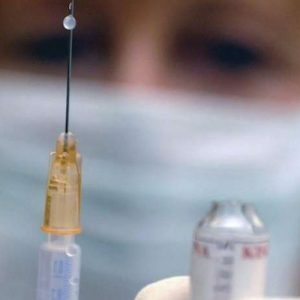
Note : Although rubella vaccine strains are alive, they do not adversely affect fetal fetal development.Therefore, even if the vaccination was carried out with an existing pregnancy, there should be no concern with the normal development of the fetus inside the uterus.And such vaccination is considered effective - antibodies are produced within 3 months and infection of rubella to a pregnant woman is not threatened.
If the first blood test for antibodies to rubella has not been identified, then it is necessary to undergo a follow-up examination.In the case of confirmation of the presence in the body of a woman, antibodies to the infectious disease under consideration should not be repeated.
Note : men do not need to take tests for the presence of antibodies to rubella.Moreover, they generally do not have to worry about whether he was ill with childhood infection or not.There is no influence on the development of the unborn child - even if at the moment of conception the man was sick with rubella, this infection is not transmitted with the seed.
What should a woman know when planning a pregnancy?
You can not hope for "maybe" and believe the words of my mother that a woman in childhood was sick with rubella.It is impossible to think that if all life the infection bypassed the lady side, then for some 9 months nothing will happen.Disease transmitted by airborne droplets and can not be prevented from it.But the above opinions lead to a nervous pregnancy - a woman will worry about a possible infection with rubella, be nervous about a neighbor who sits at home with a child sick with this infection.Such a psycho-emotional state will only bring harm - even if there are no rubella infections during the child's bearing, nervous and irritations can lead to prenatal and post-natal depression.
There is an opinion, and it was supported by statements from the world press that rubella vaccination could lead to the development of autism.However, such data were disproved - numerous studies do not confirm the effect of rubella vaccination on the development of autism.Therefore, parents should not refuse to vaccinate girls against rubella - this will help prevent problems in its future with pregnancy.
What do clinicians do for rubella during pregnancy?
If the irreparable happened and a pregnant woman is diagnosed with rubella, the doctors take the following measures:
- At the term of up to 16 weeks of pregnancy, an artificial termination of pregnancy occurs.Moreover, this operation will be performed irrespective of how seriously the infectious disease under consideration is taking place in a woman.Even if there are no standard rubella symptoms in the patient, but blood tests show the presence of the virus, abortion is inevitable.
- If the infectious disease in question is diagnosed at a period longer than 16 weeks of pregnancy and doctors presume infection of the fetus, then doctors also perform an artificial termination of pregnancy. Please note : the maximum term of artificial delivery is 28 weeks.
- In the case of rubella, for a gestation period of more than 28 weeks, this woman is registered in a high-risk group.Doctors immediately conduct prevention of placental insufficiency and premature birth.Women with rubella at this period of pregnancy are in the hospital before delivery - this is necessary to provide emergency medical care in case of force majeure.
 Please note : a pregnant woman may refuse to artificially terminate a pregnancy by backing her decision with a written statement.But in this case, with violations in the development of the child and possible problems in the process of childbirth, all responsibility with medical workers is removed.
Please note : a pregnant woman may refuse to artificially terminate a pregnancy by backing her decision with a written statement.But in this case, with violations in the development of the child and possible problems in the process of childbirth, all responsibility with medical workers is removed.
Rubella is an absolutely safe infection, but only in relation to children.If the adult is already infected, then the disease will be very difficult, accompanied by a strong intoxication of the body.
But in the case of pregnant women, rubella often goes completely asymptomatic - the presence of the virus can be detected only by examining the blood.Therefore, in order to prevent the development of undesirable consequences of such banal childhood infection in case of suspected contact with a sick child or adult, the gynecologist should immediately report this.The pregnant will be examined and will make an adequate and competent decision regarding the continuation of the child's bearing.
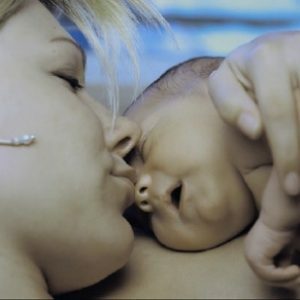 Forecasts for rubella in a pregnant woman are unfavorable - the risk of having an inferior toddler is too high.Moreover, directly at birth, pathologies may not be detected, but as the child grows and develops, the lesions of the central nervous system, the organs of hearing and vision, and the brain manifest themselves without fail.
Forecasts for rubella in a pregnant woman are unfavorable - the risk of having an inferior toddler is too high.Moreover, directly at birth, pathologies may not be detected, but as the child grows and develops, the lesions of the central nervous system, the organs of hearing and vision, and the brain manifest themselves without fail.
Only a woman can resist this danger - you need to undergo a survey, and if necessary, vaccination, before conception, during pregnancy planning.This will become the key to the birth of a healthy child.To get more information about rubella during pregnancy, congenital rubella, prognosis of doctors and preventive measures, you can watch this video review:
Tsygankova Yana Alexandrovna, medical reviewer, therapeutist of the highest qualification category.



